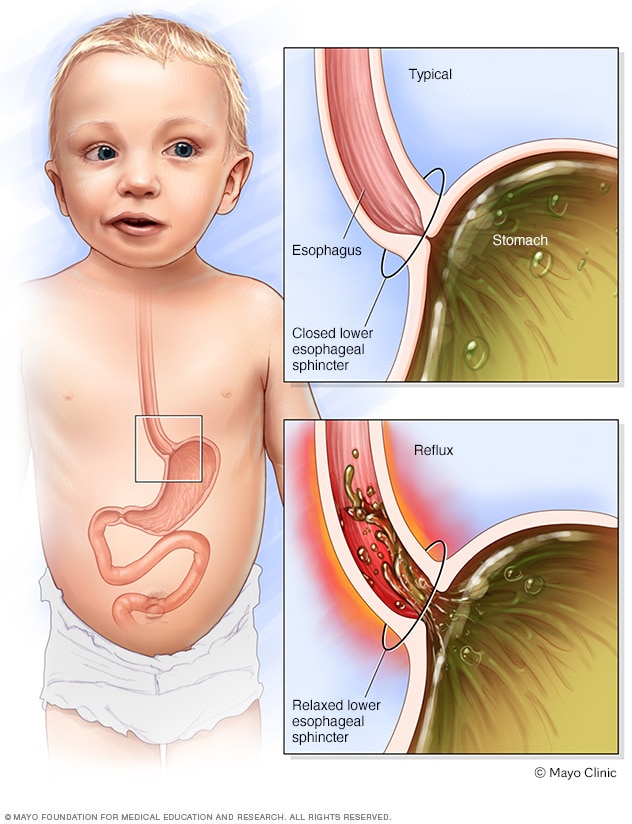Overview
Infant acid reflux

Infant acid reflux
If the muscle between the esophagus and the stomach relaxes when the stomach is full, food might flow up the baby's esophagus. The muscle is called the lower esophageal sphincter.
Infant reflux is when a baby spits up liquid or food. It happens when stomach contents move back up from a baby's stomach into the esophagus. The esophagus is the muscular tube that connects the mouth to the stomach.
Reflux happens in infants many times a day. If your baby is content and growing well, reflux is not a cause for concern. Sometimes called gastroesophageal reflux, also called GER, the condition becomes less common as a baby gets older. It's unusual for infant reflux to continue after age 18 months.
Rarely, infant reflux leads to weight loss or growth that lags behind that of other children of the same age and sex. These symptoms may mean that your baby has a medical issue. This issue could be an allergy, a blockage in the digestive system or gastroesophageal reflux disease, also called GERD. GERD is a form of GER that causes serious health issues.
Products & Services
Symptoms
Most of the time, infant reflux isn't a cause for concern. It's not usual for stomach contents to have enough acid to irritate the throat or esophagus and cause symptoms.
When to see a doctor
See a healthcare professional if a baby:
- Isn't gaining weight.
- Consistently spits up forcefully, causing stomach contents to shoot out of the mouth. This is called projectile vomiting.
- Spits up green or yellow fluid.
- Spits up blood or stomach contents that look like coffee grounds.
- Refuses to feed or eat.
- Has blood in the stool.
- Has difficulty breathing or a cough that won't go away.
- Begins spitting up at age 6 months or older.
- Is very irritable after eating.
- Doesn't have much energy.
Some of these symptoms may mean serious but treatable conditions. These include GERD or a blockage in the digestive tract.
Causes
In infants, the ring of muscle between the esophagus and the stomach is not yet fully developed. This muscle is called the lower esophageal sphincter, also known as LES. When the LES is not fully developed, it allows stomach contents to flow back up into the esophagus. Over time, the LES typically matures. It opens when a baby swallows and remains tightly closed at other times, keeping stomach contents where they belong.
Some factors that contribute to infant reflux are common in babies and often can't be avoided. These include lying flat most of the time and being fed an almost completely liquid diet.
Sometimes, infant reflux can be caused by more-serious conditions, such as:
- GERD. The reflux has enough acid to irritate and damage the lining of the esophagus.
- Pyloric stenosis. A muscular valve allows food to leave the stomach and enter the small intestine as part of digestion. In pyloric stenosis, the valve thickens and becomes larger than it should. The thickened valve then traps food in the stomach and blocks it from entering the small intestine.
- Food intolerance. A protein in cow's milk is the most common trigger.
- Eosinophilic esophagitis. A certain type of white blood cell builds up and injures the lining of the esophagus. This white blood cell is called an eosinophil.
- Sandifer syndrome. This causes tilting and rotation of the head that are not usual and movements that look like seizures. It's a rare complication of GERD.
Risk factors
Infant reflux is common. But some things make it more likely that a baby will have infant reflux. These include:
- Premature birth.
- Lung conditions, such as cystic fibrosis.
- Conditions that affect the nervous system, such as cerebral palsy.
- Previous surgery on the esophagus.
Complications
Infant reflux usually gets better on its own. It rarely causes problems for babies.
If your baby has a more serious condition such as GERD, your baby's growth may lag behind that of other children. Some research suggests that babies who have frequent episodes of spitting up might be more likely to develop GERD later in childhood.
Dec. 10, 2024